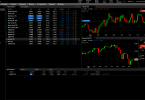If you’re a seasoned stock picker with experience of the US markets and simply want to use this article to check whether you could get a better deal on a different platform, you can skip this bit. But for novices, the following list should help you get going with direct equity investing in the world’s biggest stock market.
1. You can hold US shares in your ISA
Every Briton has a £20,000 ISA allowance every year and the money held in an ISA is exempt from capital gains and income tax. So don’t worry, you don’t have to forgo these benefits just because you’re investing in US shares.
2. You have to complete a W-8BEN form prior to buying US shares
A W-8BEN is a tax form you have to complete to say that you’re not a US resident. Most platforms which offer US share dealing include a link to the form which they then submit to the US tax authority on your behalf. By completing the form you are agreeing to pay 15% withholding tax on dividend income earned on US shares. This is deducted at the source so reinvesting your dividends won’t help you sidestep paying the tax. Income investors might want to stick to British shares.
3. The New York Stock Exchange (including the Nasdaq) is open from 9.30am to 4pm eastern time
That is 2.30pm to 9pm GMT so if you’re looking to buy shares when the market is open, you have a slightly different window to the UK share dealing time.
As some investment platforms don’t allow you to set limit orders for US shares, you’ll need to use your US share dealing window.
4. Not all platforms offer US share dealing
If you’re just getting started in investing and know you’re going to want to invest directly in US companies, make sure you pick an online stockbroking platform which gives you access.
5. Not all platforms which offer US share dealing have access to the entire market
And make sure they offer all the shares you want. Some of the newer platforms and apps offer access to only the highest profile stocks like Facebook and Tesla. If you want access to the whole US market, you’ll need to check the extent of your platform’s offering.
6. Platforms often charge more for dealing US shares than they do for UK ones
Just like domestic investing, it’s important that investors looking to buy overseas stocks don’t see their returns eroded by fees.
Comparing fees isn’t always simple. Different brokers and platforms make their money in different places. For example, some platforms offer cheap dealing fees (the fees charged each time you buy a stock), but high holding fees (the regular fees for looking after your money). Others offer deals for regular trading, so if you buy a lot of shares every month it becomes cheaper the following month.
The newer platforms and apps offer very cheap fees, but beware that you’ll pay for that privilege with a wide bid-ask spread. That means that the real-time share price might not be the one that is available to you to buy.
Picking a platform is a personal decision. Our research below can give you pointers, but make sure you pick the platform that is best for your own style of investing.
7. Beware foreign exchange fees
The peskiest fee for international investors is the fee that you’ll pay on foreign exchange.
Most platforms hold your money in sterling, but the prices you will see for buying US stocks are in dollars. That means when you choose to buy a stock you will be paying the real-time currency conversion, plus the foreign exchange fee offered by the platform.
Some brokers (and a rising number of DIY platforms) allow you to hold your money in a foreign currency. This means you won’t have to pay foreign exchange fees when you actually trade shares but you will have to pay a fee for the original conversion to dollars and when you want to convert your money back to sterling. Plus, as you can’t hold foreign currencies in your ISA you’ll be missing out on the tax benefits.
Platform Comparison: How to pick the Right Platform for You
The following table lists the basic fees of the top platforms and brokers available to UK investors looking for US exposure.
| Platform | ISA Custody Fee* | Share Trading | FX rate | |
| AJ Bell Youinvest | 0.25% (capped at £3.50 per month) | 0-9 trades per month: £9.95 per trade 10+ trades per month: £4.95 |
0.75% (first £10k) 0.5% (next £10k) 0.25% (over £20k) |
|
| DEGIRO | Free for share dealing account (NB: No ISA availble) | Free, plus €1 per trade handling fee | 0.25% | |
| Fineco Bank | 0.25% value of portfolio (capped at £2.95 per month) Free until 5 April 2024 |
$3.95 | Free | |
| FreeTrade | Standard: £5.99 Plus: £9.99 Charged monthly |
£0 | Standard: 0.59% Plus: 0.39% |
|
| Hargreaves Lansdown | 0.45% of the value of shares (capped at £45 per year) | 0-9 trades per month: £11.95 per trade 10-19: £8.95 20+: £5.95 |
1.00% | |
| IG | £24 per quarter (Exception for investors who trade more than 3 times a quarter or hold more than £15k of funds across all their IG accounts) |
0-2 trades per month: £10 per trade 3+ trades per month: Free |
0.50% | |
| Interactive Brokers | £3 per month minimum activity fee (deductible if trading fees exceed £3 per month) | <300k shares traded per month: $0.0035 per share 300k-3: $0.002 3m-20m: $0.001 <20m: $0.005 (Capped at 1% of total trade) Plus regulatory dealing fees |
0.03% (minimum $2) | |
| Interactive Investor | Investor: £11.99 Super Investor: £19.99 Charged monthly |
Investor: 1 trade free per month, then £3.99 per trade Super Investor: 2 trades free per month, then £3.99 |
1.5% (transaction value >£25k) 1.25% (£25k-50k) 1% (£50k-£100k) 0.5% (£100k-£600k) 0.25% (<£600k) |
|
| *For holding and dealing shares | ||||
The Hargreaves Lansdown trading platform is a bit slow and clunky. HL now pays a reasonable rate of interest on cash balances, around 1.50% depending on the amount, this has gone up about 1% this year, with cash trapped in an ISA or SIPP, this could make a difference. IG don’t pay anything.
Service also varies considerably. I had a simple matter with IG, when a ETF delisted and transferring to a different ETF, so simple, this took numerous phone calls, emails and threats of closing my account to resolve. They should have advised me options which they never did. HL not as good as they used to be but much better than IG.
If you’re slightly overwhelmed by the amount of information in the spreadsheet, you are not alone. Platform comparison is complicated by the amount of different fees and the fact that you can’t compare like with like. The detail below aims to help investors identify the platform or broker that suits them.
Subscription-based platforms
- Freetrade
- Interactive Investor (ii)
These platforms charge a monthly rate for investing services. They both offer an ISA with which you can buy US shares and allow you to trade freely (although Interactive Investor limits this to just one or two trades per month, depending on which plan you are on).
Freetrade offers the cheapest monthly subscription, trading is free and fx fees are the lowest in its peer group. But beware you won’t get access to the full US market.
Interactive Investor gives you access to the entire US market and has a broader suite of educational resources and ideas. You also get as many free junior ISAs as you have children. But you’ll pay for the privilege with a higher monthly subscription and charges for more than one trade per month. The FX fee is also significantly higher than its peers.
Freetrade is a good option for investors just starting out who want to buy and sell regularly, while ii suits investors whose portfolio rarely changes.
Foreign Platforms
- Fineco Bank
- Degiro
- Interactive Brokers
There are many non-UK companies which offer investment services to UK residents. Fineco (Italy), Degiro (Netherlands) and Interactive Brokers (US) are three of the best (although their websites are slightly harder to navigate than their British-based peers).
Fineco and Interactive both offer ISA accounts to UK residents from which they can trade foreign shares. Degiro currently doesn’t offer an ISA.
All three companies offer competitive prices especially on foreign exchange and allow you to hold money in a foreign currency. Note that fees are denominated in local currencies so beware the conversion charge if you are holding your investment in sterling.
Platforms for Getting Started
- Freetrade
- AJ Bell
AJ Bell’s regular fee for holding your money (known as the custody fee) is cheaper than that of Freetrade, but you’ll pay quite a lofty price whenever you want to buy a new share (£9.99 unless you trade more than 10 times a month). Both platforms boast excellent, user-friendly apps and have been praised for their service and communication.
But new investors should beware the ease with which these apps make stock-picking appear. Freetrade (and the other free trading apps) have been accused of contributing to the gamefication of investing with good reason. Buying and selling shares regularly should not be treated lightly. Investors should always fully research stocks that they are considering buying and make sure they don’t make rash, unfounded trading decisions (either buying or selling).
AJ Bell’s trading fees can be off-putting to investors who only have small portfolios (and might therefore only buy small fractions of shares), but new investors with small portfolios perhaps shouldn’t yet be stock picking and might make better returns through passive funds or investment trusts (both of which are offered by AJ Bell).
Freetrade is a great option for investors with small portfolios who want to trade regularly. But stock pickers who use the app regularly should ensure discipline.
Platforms for Experienced Investors
- Interactive Brokers
- Degiro
- IG
IG’s share dealing platform isn’t as user friendly as some of its peers, but it does offer all the tools that investors might want for sensible, disciplined stock picking. Investors can set up limit orders on US shares and set up orders for out-of-hours trading. The fees are relatively competitive: you only have to make three trades a month to qualify for free share dealing and foreign exchange fees are just 0.5%.
Interactive Brokers fees are charged by the number of shares bought (rather than per trade), which makes price comparison relatively complicated, but consensus suggests this is a cheap platform for foreign investing. Degiro offers free trading, but beware you’ll pay a €1 handling fee per trade. Both platforms offer very competitive foreign exchange fees and allow you to hold money in foreign currencies.
Platforms to Avoid for US Investing
- Hargreaves Lansdown
Britain’s biggest platform is wonderful for investing in collective investment vehicles such as funds, but it is very expensive for US share dealing. On top of the 0.45% holding fee (which is capped at £45 per year) you’ll pay £11.95 per trade and need to buy 11 shares a month (which equates to £131.45 of trading fees) before qualifying for the lower rate. And on top of that, the FX charges are 1%.
If you’re one of Hargreaves’ many customers and you’re thinking about adding US exposure with direct equity investing, you are probably best off setting up an additional account at a new platform.
The lists above provide only a snippet of the number of full service and online brokers out there for investing in US shares. If you have any other suggestions, please let us know in the comments section.






